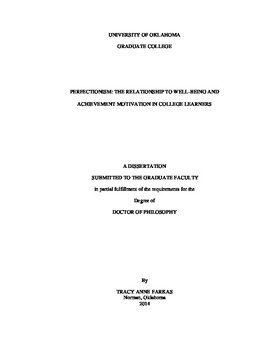| dc.contributor.advisor | DeBacker, Teresa | |
| dc.contributor.author | Farkas, Tracy | |
| dc.date.accessioned | 2015-01-21T21:34:46Z | |
| dc.date.available | 2015-01-21T21:34:46Z | |
| dc.date.issued | 2014-12-12 | |
| dc.identifier.uri | https://hdl.handle.net/11244/14056 | |
| dc.description.abstract | This study consisted of 354 university students and examined the relationship between facets of perfectionism and measures of emotional well-being, achievement motivation, and emotions. Cluster analysis was performed using the Short Form of the Revised Almost Perfect Scale (SAPS). The results of cluster analysis yielded three clusters that represented adaptive perfectionists, maladaptive perfectionists, and non-perfectionists. These three perfectionism typologies were compared on the Unconditional Self-Acceptance Questionnaire (USAQ), the Performance Failure Appraisal Inventory-Short Form (PFAI), the Achievement Goal Questionnaire (AGQ), and the Topic Emotions Survey. The findings indicated that the negative feature of perfectionism (e.g., discrepancy) and maladaptive perfectionists qualitatively differed from adaptive and non-perfectionists on measures of emotional well-being, achievement motivation, and emotions. | en_US |
| dc.language | en_US | en_US |
| dc.subject | perfectionism | en_US |
| dc.subject | well-being | en_US |
| dc.subject | achievement motivation | en_US |
| dc.subject | academic emotions | en_US |
| dc.title | Perfectionism: The relationship to well-being and achievement motivation in college learners. | en_US |
| dc.contributor.committeeMember | Beach, Sara Ann (Sally) | |
| dc.contributor.committeeMember | Crowson, H. Michael | |
| dc.contributor.committeeMember | Greene, Barbara | |
| dc.contributor.committeeMember | Heddy, Benjamin | |
| dc.date.manuscript | 2014-01-08 | |
| dc.thesis.degree | Ph.D. | en_US |
| ou.group | Jeannine Rainbolt College of Education::Department of Educational Psychology | en_US |
